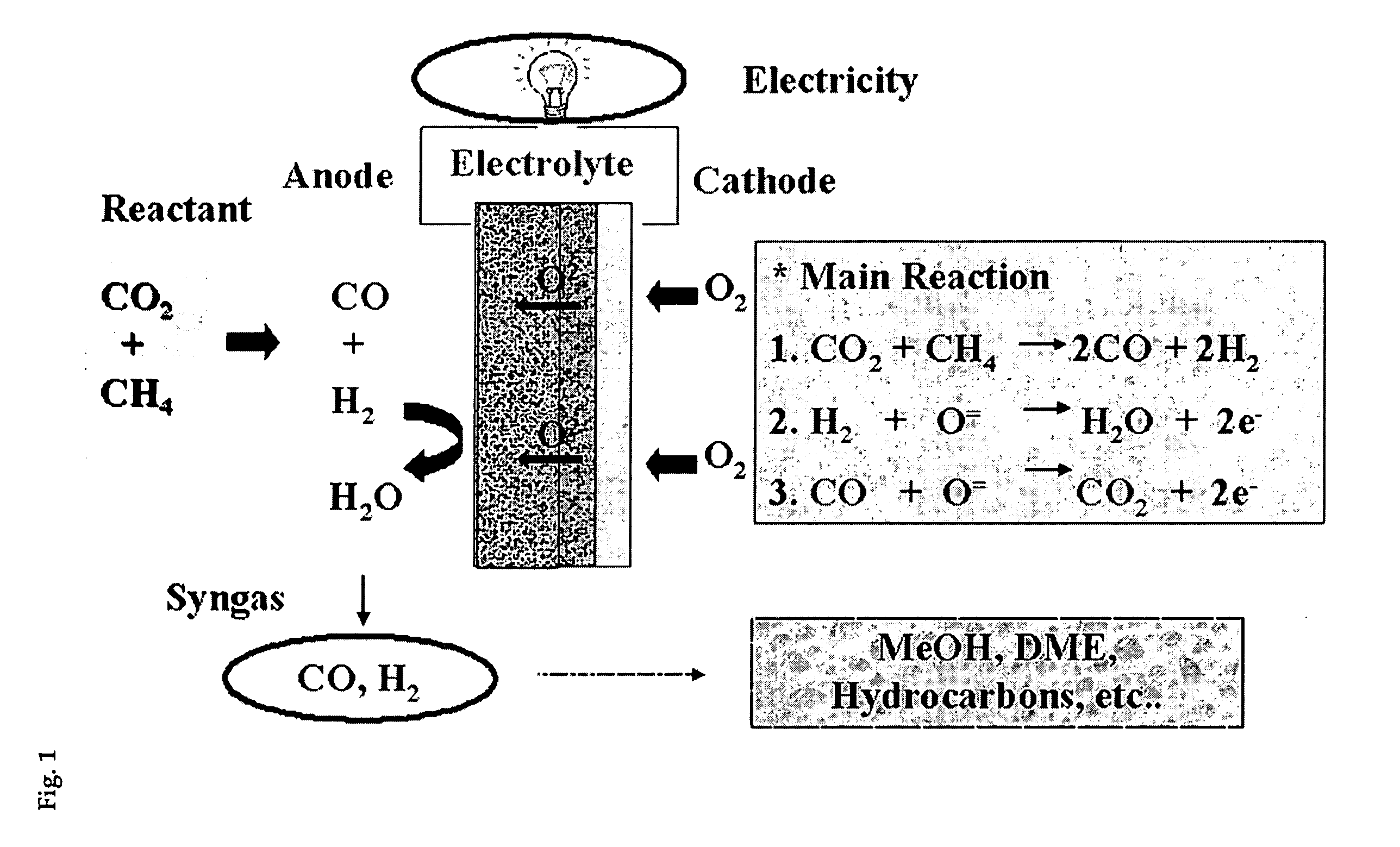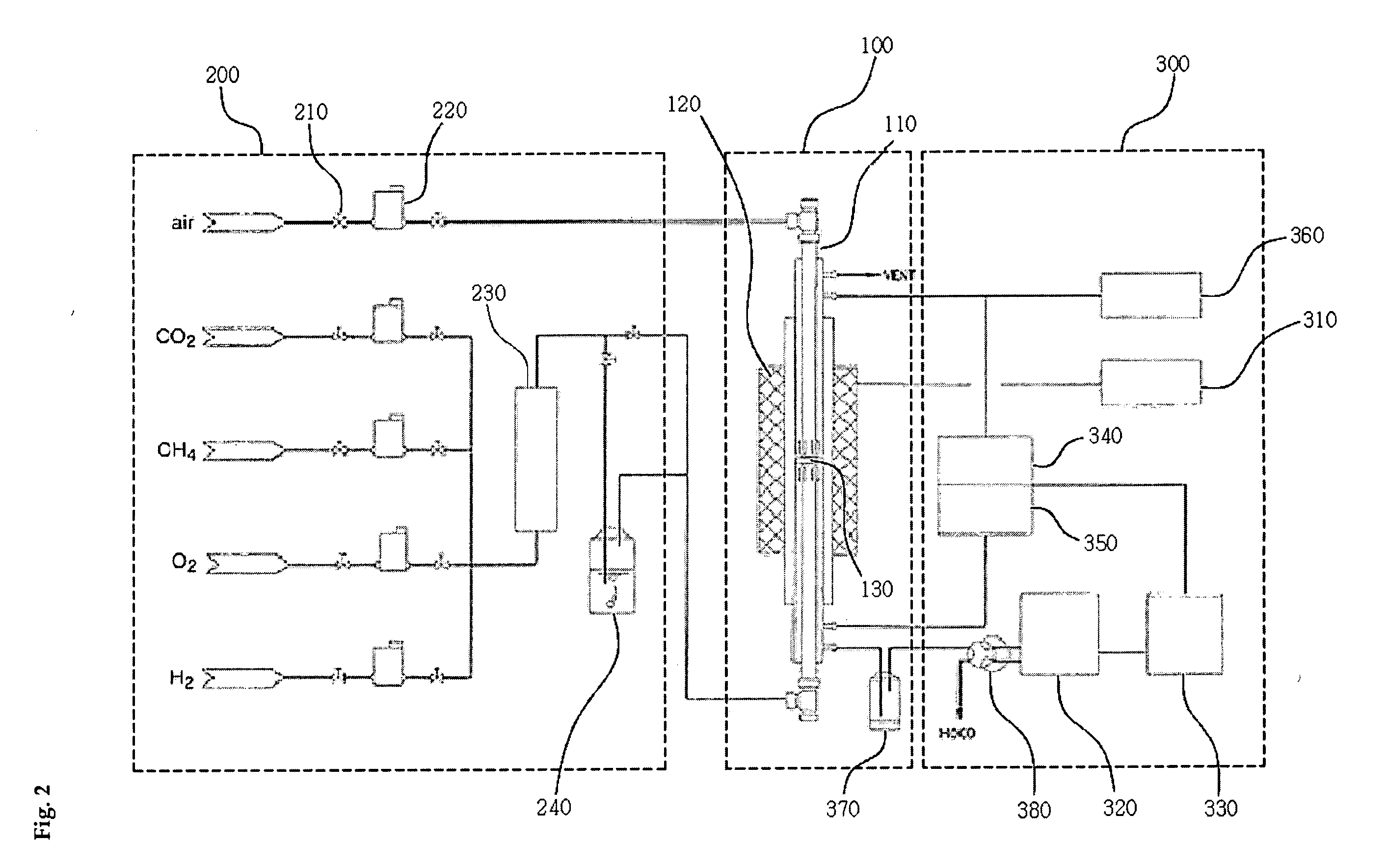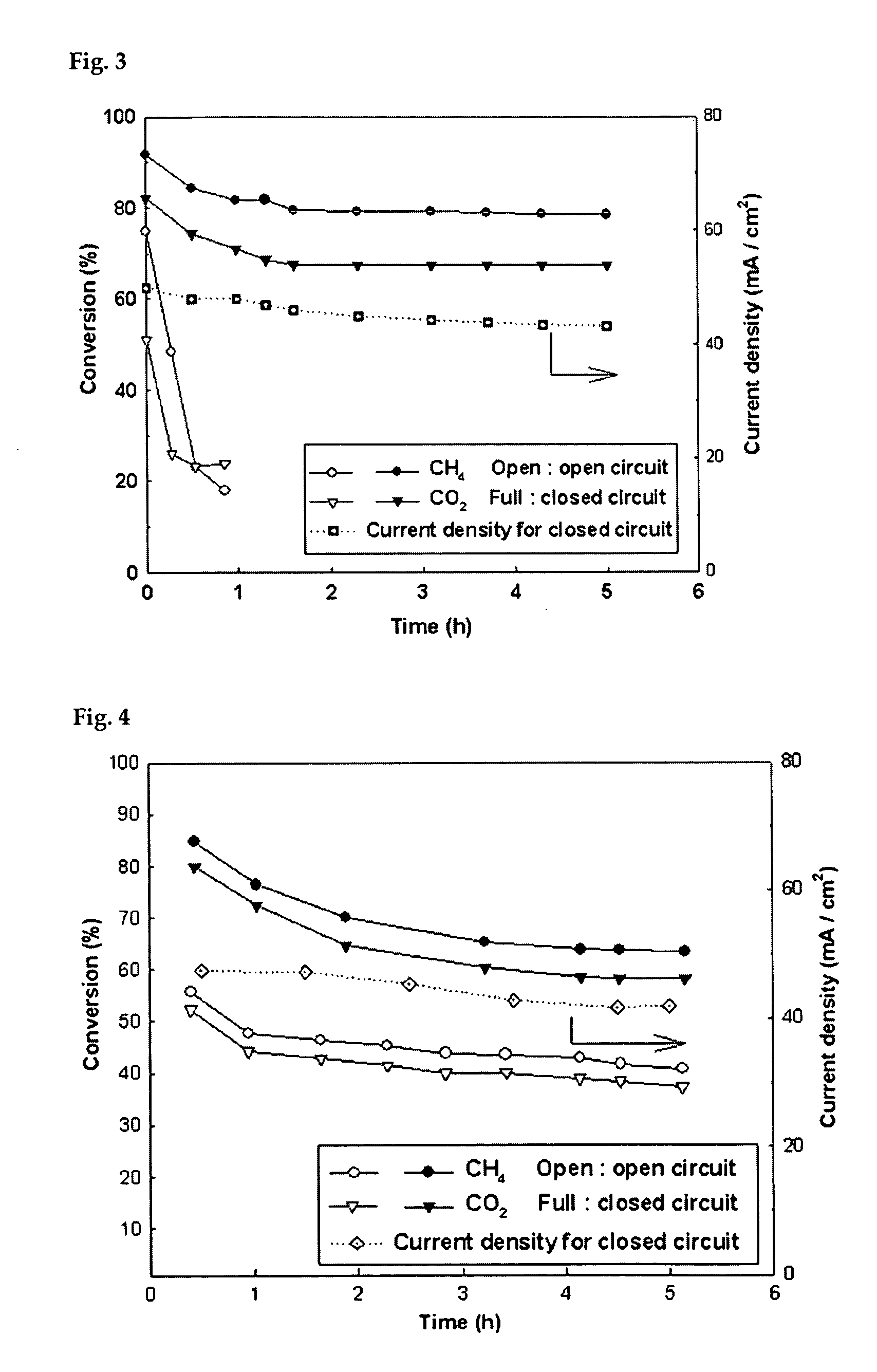Solid oxide fuel cell (SOFC) for coproducing syngas and electricity by the internal reforming of carbon dioxide by hydrocarbons and electrochemical membrane reactor system
a technology of hydrocarbons and carbon dioxide, which is applied in the direction of fuel cells, solid electrolyte fuel cells, cell components, etc., can solve the problems of high energy consumption, endothermic and therefore high energy consumption, and emission of additional greenhouse gases, so as to maximize the effect of co2 utilization
- Summary
- Abstract
- Description
- Claims
- Application Information
AI Technical Summary
Benefits of technology
Problems solved by technology
Method used
Image
Examples
example 1
Preparation of Perovskite Type Catalyst
[0038] For manufacturing a perovskite type catalyst having a composition of La1-ySryNi1-xCrxO3 (x=0-1 and y=0-1), metal nitrate was used as a precursor. Oxide having a composition of LaNiO3 [La1-ySryNi1-xCrxO3 (x=0 and y=0)] was prepared by dissolving 8.6604 g of lanthanum nitrate and 5.8162 g of nickel nitrate in 100 g of ultra-pure water. Malic acid was added to the resultant at an extent that the mole ratio of malic acid to total metal ion was 1.5. To the mixed aqueous solution, aqueous ammonia and nitric acid were added dropwise with agitation to adjust pH of the solution to 2.5. The precipitated catalyst precursor was dried at 80□ for 6-12 hr in oven to remove water. The following viscous solution was additionally heated at 100□ for drying. Then, the catalyst precursor was additionally heat-treated at 210□ to thermally decompose NO2 and other gases. The resulting oxide was grinded using a mortar to prepare solid powder and then, heated un...
example 2
Preparation of Ni-YSZ Type Catalyst
[0040] For preparing Ni-YSZ type catalysts [Ni: YSZ: CeO2 (or MgO)=(40-55 wt %): (40-55 wt %): (0-10 wt %)], NiO powder (99.99 Sigma-Aldrich Co.), YSZ powder (8 mol % Y2O3 doped ZrO2, TOSOH Co.), MgO powder (98%, Nakarai Chemical Co.) and CeO2 powder (99.9%, Sigma-Aldrich Co.) were used as a precursor.
[0041] Firstly, Ni, YSZ and CeO2 (or MgO) powder were mixed in a certain amount and subject to attrition milling for 24 hr by use of zirconia ball, obtaining material for catalyst electrode. In addition, Ni-YSZ type catalysts were prepared according to co-precipitation method. Ni-YSZ type catalysts having various compositions were prepared according to the procedures described above. The compositions are summarized in Table 2.
TABLE 2Ni—YSZ—CeO2NiOYSZCeO2Ni—YSZ catalystwt %Ni—YSZ5545—Ni—YSZ—CeO2(2 wt %)54442Ni—YSZ—CeO2(4 wt %)53434Ni—YSZ—MgO(2 wt %)54442Ni—YSZ—MgO(4 wt %)53434
example 3
Manufacture of Electrochemical Cell for SOFC
[0042] The electrochemical single cells of electrolyte or anode supported SOFC were manufactured as follows:
(1) Manufacture of Single Cell for Electrolyte Supported SOFC
[0043] Firstly, YSZ electolyte were processed using molder to prepared pellet with compact structure and sintered at 1400□ for 2 hr, obtaining disk-shaped electrolytes. The thickness and diameter of YSZ electrolyte prepared were 1.2 mm and 22.5 mm, respectively.
[0044] Slurry for coating electrode material was prepared in accordance with the following procedures. 0.87 g of methyl cellulose, 1.14 g of CMC (carbonylmethyl cellulose) and 1.74 g of polyethylene oxide as a binder were added to 0.2 g of electrode material prepared above. 3 ml of isopropyl alcohol as a dispersant was added dropwise to the aqueous solution mixed with binders and agitated to mix well materials in slurry. After 2-hr agitation, slurry for catalyst electrode was prepared.
[0045] In addition, slurry...
PUM
 Login to View More
Login to View More Abstract
Description
Claims
Application Information
 Login to View More
Login to View More - R&D
- Intellectual Property
- Life Sciences
- Materials
- Tech Scout
- Unparalleled Data Quality
- Higher Quality Content
- 60% Fewer Hallucinations
Browse by: Latest US Patents, China's latest patents, Technical Efficacy Thesaurus, Application Domain, Technology Topic, Popular Technical Reports.
© 2025 PatSnap. All rights reserved.Legal|Privacy policy|Modern Slavery Act Transparency Statement|Sitemap|About US| Contact US: help@patsnap.com



